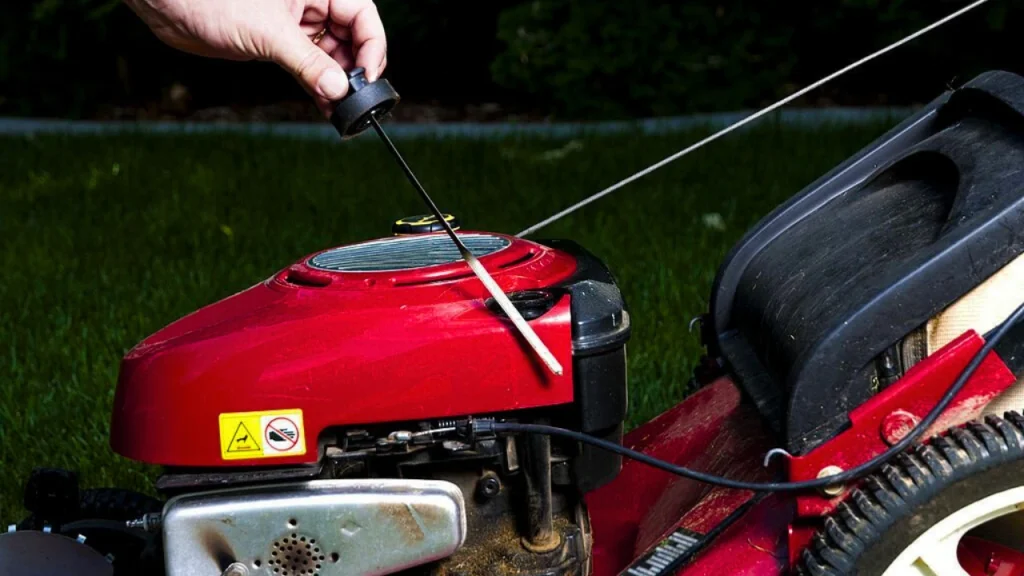Maintaining a lawn mower can be a bit of a hassle, but one of the critical aspects of keeping your machine running smoothly is using the perfect engine oil. You might be tempted to just grab any old oil off the shelf, but that could lead to some serious problems down the line. Without proper lubrication, the internal parts of your mower can wear out quickly, causing all sorts of damage and headaches.
Also, you can’t use any kind of lawn mower oil for your lawn mower. So how to choose the perfect oil for a lawn mower engine?
Different types of lawn mower oils work best in different situations, and choosing the right one can save you a lot of trouble and expense. SAE 30, SAE 10W-30, SAE 5W-30, Synthetic SAE 5W-30, and Vanguard 15W-50 are expert and manufactured recommended lawn mower oil. Each one has its own strengths and weaknesses, and the one you choose will depend on factors like the size of your mower, the type of engine it has, and the temperature range in which you’ll be operating it.
For example, SAE 30 is an old-school oil great for big, warm-weather engines, while multi-grade oils like SAE 10W-30 and SAE 5W-30 are versatile enough to work in a variety of conditions. Synthetic SAE 5W-30 is a top-of-the-line oil that delivers outstanding performance and fuel efficiency, even in the most extreme environments.
In this article, we’ll delve deeper into the different types of lawn mower oils, looking at their pros and cons, and we’ll give you some tips on how to pick the right oil for your mower.
Why is Lawn Mower Oil Important?
Proper lubrication is essential to the smooth operation of any machine, and your lawn mower is no exception. Without the right type of engine oil, your mower’s internal parts can quickly wear down and cause damage, leading to costly repairs or even the need for a new machine.
The main purpose of lawn mower oil is to reduce friction between the moving parts of the engine, which in turn reduces wear and tear on those parts. When metal parts rub together without proper lubrication, they create heat and friction that can cause them to break down over time. Engine oil provides a protective barrier that keeps these parts from rubbing together and helps them move smoothly and efficiently.
In addition to reducing friction and wear, the right type of oil can also help regulate the temperature of your mower’s engine. Lawnmowers operate in a wide range of temperatures, from freezing winter days to scorching summer afternoons. Using the appropriate oil for your mower’s operating temperature range can help keep the engine running smoothly, prevent overheating, and extend the life of your machine.
Lawn Mower Oil Types
There are two main types of oils used in lawn mowers for better performance – synthetic and conventional oils.
Synthetic oils offer superior lubrication and protection to engines and are ideal for extreme temperatures. They are generally recommended for high-performance engines. On the other hand, conventional oils are made from crude oils and are best suited for small engines.
The type of oil your lawn mower needs also depends on the engine type – two-cycle or four-cycle engines. Two-cycle engines require a mixture of gasoline and oil, while four-cycle engines require separate tanks for gasoline and oil.
For two-cycle engines, the gasoline and oil need to be premixed before being poured into the engine. The ratio of gas and oil varies depending on the manufacturer, and it is essential to follow the guidelines provided in the user’s manual for the appropriate oil and ratio.
For four-cycle engines, you need to add oil and gas separately. Generally, these engines require 30-weight oil, which refers to the thickness or viscosity of the oil.
It’s important to note that the appropriate oil for your lawn mower also depends on the mower’s size, capacity, and operating temperature range. Choosing the wrong type of oil can result in engine damage or reduced performance.
It’s crucial to use the right type of oil suitable for your lawn mower’s specific make and model, engine type, and operating temperature range to ensure its longevity and smooth functioning.
Different Types of Lawn Mower Oil Advantages and Disadvantages
The type of oil your lawn mower needs depends on the type of engine it has, as well as factors like the climate in which you’ll be using it. There are several different types of lawn mower oil available on the market, including conventional, synthetic, and specialty oils like high-mileage oils. Understanding the differences between these types of oils can help you choose the right one for your lawn mower and ensure it runs smoothly for years to come.
1. SAE 30
SAE 30 is single-grade engine oil that is generally recommended for engines that operate at temperatures above 40°F. Its viscosity rating of 30, which means it’s not as thick as other oils and can easily flow through the engine. It’s made from conventional base oils and does not contain any additives, making it an affordable option for lawn mower owners.
SAE 30 oil is suitable for four-stroke lawn mowers with larger engines and provides enough lubrication to protect the internal parts from wear and tear. It is also a good option for mowers that are not used frequently or for those that are used for short periods. However, it is not recommended for cold weather or for use in engines with tighter tolerances, as it may not flow as well in colder temperatures and can lead to engine damage.
Advantage
- Most suitable for larger engines that operate in warm weather conditions.
- It is affordable and widely available, making it easy to find at most hardware or automotive stores.
- SAE 30 oil is also less likely to break down due to high temperatures and can reduce oil consumption.
Disadvantage
- SAE 30 oil is not suitable for smaller engines or those that operate in colder weather conditions. Using this oil in such situations can cause difficulties in starting the engine and increase the risk of wear and tear.
- Not recommended for use in high-performance engines, and it may not be suitable for mowers that run at high speeds or are frequently used.
2. SAE 10W-30
SAE 10W-30 is a multi-grade engine oil. The “10W” part of the name indicates that the oil has a cold viscosity rating of 10 and can flow easily in cold temperatures, while the “30” indicates its hot viscosity rating, meaning it maintains its thickness and lubrication properties at high temperatures. This makes it a good choice for lawn mowers that are used in a variety of temperatures, from cold mornings to hot afternoons.
The “W” in the name stands for “winter” and indicates that the oil has been tested at low temperatures to ensure it will flow smoothly during cold weather.
The SAE 10W-30 is a popular choice for many small engines because it provides reliable lubrication and protects the engine against wear and tear.
Advantage
- Suitable for use in both hot and cold weather.
- SAE 10W-30 oil is designed to offer better lubrication and protection for engine parts compared to SAE 30 oil.
Disadvantage
- SAE 10W-30 oil is typically more expensive than SAE 30 oil.
- Depending on your location, it may be more difficult to find SAE 10W-30 oil compared to more common types of oil like SAE 30.
3. SAE 5W-30
SAE 5W-30 has a low viscosity rating, which means it flows more easily in cold temperatures compared to oils with higher viscosity ratings like SAE 10W-30. Basically, this type of oil is designed to provide excellent performance in a wide range of temperatures and weather conditions, making it a popular choice for many lawn mowers. It also tends to have lower oil consumption than other types of oils, which can help save money and reduce the need for frequent oil changes.
One recommended brand of SAE 5W-30 lawnmower oil is Briggs & Stratton, which is known for its high-quality and reliable products. SAE 5W-30 oil is particularly effective during cold weather, helping to ensure the smooth and efficient operation of your lawn mower.
Advantage
- Better flow in cold temperatures compared to SAE 10W-30, which means easier starting in colder weather.
- Lower oil consumption than some other types of oil.
- Suitable for all weather conditions, making it a versatile option.
- Recommended by some experts, such as Briggs & Stratton.
Disadvantage
- More expensive than some conventional oils.
4. Synthetic SAE 5W-30
Synthetic SAE 5W-30 is a high-performance motor oil that is made using synthetic base oils and advanced additives. It offers excellent lubrication, engine protection, and fuel efficiency, even in extreme temperatures and heavy loads.
Advantage
- Superior lubrication and engine protection compared to conventional oils.
- Provides better fuel economy and reduced emissions.
- Works well in extreme temperatures, both hot and cold.
- Resists breakdown and deposits, leading to longer engine life and better performance.
- Requires less frequent oil changes compared to conventional oils.
Disadvantage
- More expensive than conventional oils.
- Not widely available in some areas, making it harder to find when you need to replace your oil.
5. Vanguard 15W-50
Vanguard 15W-50 is a high-quality synthetic engine oil specially formulated for use in small engines, including lawn mowers. It is a multi-grade oil that provides superior performance and protection in both hot and cold weather conditions.
The unique blend of high-quality synthetic base oils and advanced additives in Vanguard 15W-50 delivers excellent wear protection, enhanced fuel efficiency, and extended engine life. It also resists viscosity breakdown and deposits, keeping the engine clean and running smoothly.
Vanguard 15W-50 is particularly suitable for engines operating in extreme temperatures, including high-temperature conditions. It provides excellent thermal stability and protection against oxidation, ensuring the oil stays fresh and effective for longer periods.
Advantage
- Excellent protection against wear and tear
- Works well in high-temperature environments
- Good for heavy-duty applications
- Provides stable and consistent lubrication
- Has a long service life
- Helps maintain engine cleanliness
Disadvantage
- More expensive than conventional oils
How to Choose the Right Lawn Mower Oil
Choosing the right lawn mower oil is important for the proper functioning and maintenance of your mower. Here are some key factors to consider when selecting the right oil for your lawn mower:
Refer to the Owner’s Manual: The owner’s manual is the best place to start when it comes to choosing the right oil for your lawn mower. It will provide you with all the necessary information, including the type of oil recommended by the manufacturer and the recommended viscosity for different temperatures.
Consider Climate: The climate in your area plays a significant role in choosing the right oil for your lawn mower. If you live in an area with colder temperatures, you should go for oils with lower viscosity ratings such as 5W-30 or 10W-30, as they are designed to flow more easily in cold temperatures. In contrast, areas with warmer temperatures require oils with higher viscosity ratings such as SAE 30 or SAE 15W-40.
Type of Oil: There are two main types of oil used in lawn mower engines – synthetic and conventional. Synthetic oil provides better lubrication and protection to engines and is great for extreme temperatures, whereas conventional oil is made from crude oil and is usually best for small engines.
Engine Type: The type of oil your lawn mower needs depends on the engine type. Four-cycle engines require oil to be added separately, whereas two-cycle engines require oil to be mixed with gasoline.
Brand Recommendations: Brands such as Briggs & Stratton have specific lawn mower oils that are designed to work optimally with their engines. Be sure to check the manufacturer’s recommendations for the best results.
By considering these factors, you can choose the right lawn mower oil that will help your mower run smoothly and efficiently, leading to a longer lifespan and better performance.
How To Change Lawn Mower Oil
Changing the oil in your lawn mower is an important part of routine maintenance that helps ensure your mower continues to run smoothly. Here is a step-by-step guide on how to change lawn mower oil:
Step 1: Read the Manual
Before changing the oil, make sure to read your mower’s manual to determine what type of oil and oil filter you will need, and how much oil your mower requires. The manual will also provide instructions on how to change the oil for your specific mower model.
Step 2: Prepare Your Mower
Make sure your lawn mower is turned off and cool to the touch before beginning. Disconnect the spark plug wire to prevent accidental starting. Then, position the mower on a flat surface and lay down a tarp or newspaper to catch any spills.
Step 3: Drain the Old Oil
Locate the oil drain plug on the bottom of the engine and place an oil pan beneath it to catch the old oil. Remove the plug and allow the oil to drain completely. Be sure to dispose of the old oil properly.
Step 4: Replace the Oil Filter (if Applicable)

If your mower has an oil filter, remove it and replace it with a new one according to the manufacturer’s instructions. Because the oil filter can become clogged with debris and contaminants over time, which can negatively impact the performance and lifespan of your engine. By replacing the oil filter, you ensure that clean oil is flowing through your engine, which can lead to improved performance and longevity. Additionally, neglecting to replace the oil filter can result in a shorter lifespan of your engine, which can be costly to repair or replace.
Step 5: Refill with Fresh Oil
After the old oil has drained completely, replace the drain plug and refill the engine with fresh oil. Use a funnel to avoid spills and overfilling. Refer to your manual to determine the correct amount of oil to add.
Step 6: Check the Oil Level

After adding the new oil, run the mower for a few minutes to circulate the oil, and then turn it off. Wait a few minutes for the oil to settle, then check the oil level using the dipstick. Add more oil if necessary to reach the full mark.
Step 7: Dispose of Old Oil and Filter
Be sure to dispose of the old oil and filter properly. Many auto parts stores and service centers offer recycling services for used oil and filters.
Here is a video that’ll help you understand the process better.
Maintenance Schedule for Changing the Lawn Mower Oil
As a general rule, it’s recommended that you change your lawn mower oil every 50 hours of use or once a year, whichever comes first. However, if you notice that your oil is particularly dirty or has a burnt smell, you should change it more frequently.
FAQ
What Type of Oil Should I Use in My Lawn Mower?
The type of oil to use in your lawn mower depends on the type of engine and the climate you’re operating in. Consult your mower’s manual for the manufacturer’s recommended oil type.
What Is the Difference Between Synthetic and Conventional Oil for Lawn Mowers?
Synthetic oil provides better lubrication and protection to engines, making it a good choice for high-performance engines and extreme temperatures. Conventional oil is made from crude oil and is usually best for small engines.
Can I Use Car Oil in My Lawn Mower?
Car oil in your lawn mower as it is designed for the different demands of car engines. It is best to use oil specifically formulated for lawn mowers.
Can I Mix Synthetic and Conventional Oil in My Lawn Mower?
Mixing synthetic and conventional oil as they have different properties and mixing them could affect the performance of your engine.
How Often Should I Change the Oil in My Lawn Mower?
Every 50 hours of use or at least once a year you have to change your lawn mower oil. However, consult your mower’s manual for the manufacturer’s recommended maintenance schedule.
Can I Use SAE 30 Oil in My Lawn Mower?
SAE 30 oil is suitable for use in lawn mowers with four-cycle engines. However, always refer to your mower’s manual for the manufacturer’s recommended oil type and viscosity.
Can I Use SAE 10W-30 Oil in My Lawn Mower?
SAE 10W-30 oil is suitable for use in lawn mowers with four-cycle engines, especially in temperatures ranging from 0 to 100 degrees Fahrenheit. However, always refer to your mower’s manual for the manufacturer’s recommended oil type and viscosity.
Can I Use SAE 5W-30 Oil in My Lawn Mower?
SAE 5W-30 oil is suitable for use in lawn mowers with four-cycle engines, especially in colder temperatures. However, always refer to your mower’s manual for the manufacturer’s recommended oil type and viscosity.
Can I Use Synthetic Oil in My Lawn Mower?
Yes, you can use synthetic oil in your lawn mower as long as it is the recommended type and viscosity for your engine. Synthetic oil provides better lubrication and protection to engines, making it a good choice for high-performance engines and extreme temperatures.
Conclusion
In conclusion, choosing the right type of oil for your lawn mower is critical to maintaining its lifespan and performance. By referring to the manufacturer’s recommendations and understanding the differences between conventional, synthetic, and blended oils, you can make an informed decision that will ensure smooth operation and fewer repairs in the long run. Remember to check your oil level regularly and change it according to schedule to keep your lawn mower running at its best. With proper maintenance, you’ll be able to enjoy a well-manicured lawn with ease. So, go ahead and give your lawn mower the care it deserves!
Related posts:




